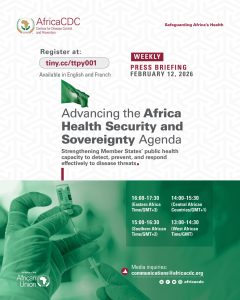New infant-friendly formulation closes a critical treatment gap for the youngest children, with support from African-led trials and global partners.
Addis Ababa, 16 August 2025 – The Africa Centres for Disease Control and Prevention (Africa CDC) welcomes the approval of the first malaria treatment specifically formulated for newborns and infants weighing less than five kilogrammes — a major advance in closing a critical gap in care for Africa’s youngest and most vulnerable.
Africa CDC commends the eight Member States — Burkina Faso, Côte d’Ivoire, Kenya, Malawi, Mozambique, Nigeria, Tanzania, and Uganda — whose participation in clinical trials was instrumental in achieving this milestone. Their leadership underscores Africa’s growing role in driving health innovation and ensuring that no child is left behind.
The new artemether-lumefantrin formulation for children was developed through a partnership between Novartis and the Medicines for Malaria Venture (MMV), under the PAMAfrica consortium, with co-funding from the European & Developing Countries Clinical Trials Partnership and the Swedish International Development Cooperation Agency.
Swiss drug regulators have approved the formulation, and rapid approvals are expected from the eight African countries under the Swiss agency’s Marketing Authorisation for Global Health Products procedure.
Until now, no approved treatment existed for infants under five kilogrammes. These children were often given modified doses of medicines for older children, raising the risk of overdose and toxicity. This new formulation offers a safe, effective, and infant-friendly option — dissolvable in breast milk and with a sweet flavour to ease administration.
Novartis plans to introduce the treatment on a primarily not-for-profit basis, aiming to increase access in malaria-endemic regions, where nearly 30 million babies are born each year.
“The approval of the treatment is a major step forward in the fight against malaria. It ensures that even the smallest and most vulnerable infants now have access to safe and effective treatment,” said Africa CDC Director General Dr Jean Kaseya.
This collaborative achievement exemplifies Africa’s commitment to accelerating access to essential health innovations.
“The approval of the new malaria treatment demonstrates the impact of Africa-led collaboration in delivering health solutions where they’re needed most,” said Dr Ngashi Ngongo, Principal Advisor to the Africa CDC Director General and Head of the Mpox Incident Management Support Team.
Africa CDC will continue to support Member States in integrating the new formulation into national health systems by:
- Updating clinical guidelines and training health workers on safe use.
- Strengthening surveillance and operational research to monitor safety and impact.
- Ensuring equitable access through local manufacturing and the African Pooled Procurement Mechanism (APPM).
- Expediting regulatory approvals through the recently established regulatory reliance mechanism among the 8 National Regulatory Authorities in collaboration with the African Medicines Regulatory Harmonization (AMRH/AUDA -NEPAD).
For Africa CDC, ensuring that every child — regardless of weight or location — can access effective malaria treatment remains a top priority.
“By making smart investments, implementing well-targeted policies, and deepening collaboration, we can ensure that all African countries become malaria-free within the coming generation,” Dr Kaseya said.
###
About the Africa Centres for Disease Control and Prevention (Africa CDC)
Africa CDC is the autonomous public health agency of the African Union, dedicated to supporting member states in strengthening their health systems. It plays a pivotal role in enhancing disease surveillance, improving emergency response capabilities, and advancing disease prevention and control across the continent.
Learn more at: http://www.africacdc.org and connect with us on LinkedIn, Twitter, Facebook and YouTube
For more information and media inquiries:
Margaret Edwin | Director of Communication and Public Information | Africa CDC EdwinM@africacdc.org







